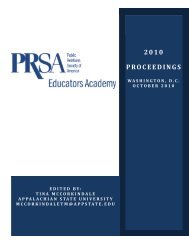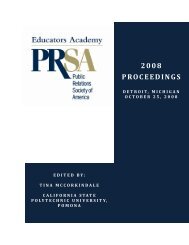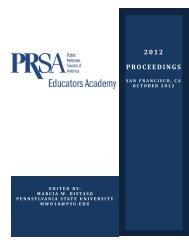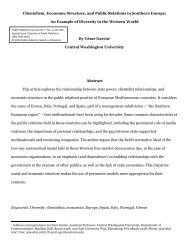2009 PROCEEDINGS - Public Relations Society of America
2009 PROCEEDINGS - Public Relations Society of America
2009 PROCEEDINGS - Public Relations Society of America
You also want an ePaper? Increase the reach of your titles
YUMPU automatically turns print PDFs into web optimized ePapers that Google loves.
that public relations was an exceptional—more ethical and socially oriented than other<br />
occupations—pr<strong>of</strong>ession.<br />
The sense <strong>of</strong> pride about the pr<strong>of</strong>ession is one <strong>of</strong> the components <strong>of</strong><br />
pr<strong>of</strong>essionalism, along with a practitioner’s willingness to promote the image <strong>of</strong> the<br />
pr<strong>of</strong>ession and pursue qualities and ideals within the pr<strong>of</strong>ession (VanZandt, 1990). The<br />
students’ pride about public relations was noticeable in many reports. As an example, a<br />
participant, explaining what “leadership in PR” means to her, wrote: “To me it means<br />
being successful and hard-working, caring and self-motivated person. It means being<br />
good as your job” (italic is added).<br />
In general, participants’ reports appeared to be in accordance with Bowen’s<br />
(2007) statement, “In the public relations discipline, ethics includes values such as<br />
honesty, openness, loyalty, fair-mindedness, respect, integrity, and forthright<br />
communication” (p. 3). The fact that students indicated only three categories <strong>of</strong> terminal<br />
values (Wisdom, A comfortable life, and Social recognition) as important values for PR<br />
leaders might be explained by the fact that the number <strong>of</strong> instrumental values a person<br />
possess is several times more than the number <strong>of</strong> terminal values (Rokeach, 1973).<br />
However, as the author noted, “One mode <strong>of</strong> behavior may be instrumental to the<br />
attainment <strong>of</strong> several terminal values; several modes may be instrumental to the<br />
attainment <strong>of</strong> one terminal value” (p. 12). Overall, participants perceived PR leaders as<br />
noble individuals who are ethical, responsible, motivated, caring, empathetic, respected,<br />
and charismatic.<br />
Conclusion<br />
The findings <strong>of</strong> this study contribute to an understanding <strong>of</strong> the image <strong>of</strong> the<br />
public relations pr<strong>of</strong>ession and leadership held by public relations majors. Student<br />
respondents appear to perceive public relations as an occupation that is somewhat<br />
superior to other pr<strong>of</strong>essions. Although their views were skewed toward the “glamorous”<br />
(Bowen, 2003) aspect <strong>of</strong> PR practitioners’ careers, an important finding is that students<br />
regard public relations as an inherently ethical and society-oriented practice. In addition,<br />
their interpretations <strong>of</strong> the pr<strong>of</strong>essional leadership suggest that participants thought about<br />
leaders as transformational leaders, who motivate and inspire “by providing meaning and<br />
challenge to their followers’ work” (Bass, 1998, p. 5).<br />
The intertwining <strong>of</strong> the two kinds <strong>of</strong> perceptions—public relations is more<br />
prestigious and more ethical than other pr<strong>of</strong>essions—might indicate that these students<br />
possess an idealized understanding <strong>of</strong> the pr<strong>of</strong>ession. This finding contradicts previous<br />
research: Bowen (2003) found that new or potential PR majors had negative perceptions<br />
<strong>of</strong> the field. Besides the fact that Bowen’s (2003) and present studies were concerned<br />
with different research questions, another explanation for the discrepancy between the<br />
two findings is that 57 percent <strong>of</strong> participants <strong>of</strong> the present study were juniors and<br />
seniors, who had had a few specialized courses in public relations before they<br />
participated in the survey.<br />
If this explanation is correct, it might be suggested that public relations education<br />
can have an impact on students with respect to overcoming their negative perceptions <strong>of</strong><br />
the pr<strong>of</strong>ession. However, the participants <strong>of</strong> the study were not surveyed in their first year<br />
at the university, and the authors are careful about drawing any conclusions about the<br />
effectiveness <strong>of</strong> public relations education.<br />
18

















